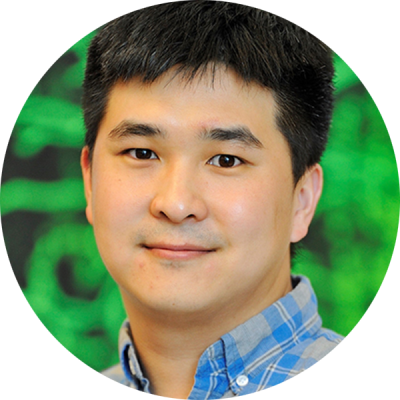
Kanghoon Jung
Navigation is an essential behavior for the survival of a wide range of animal species. The brain must execute fast and efficient ‘where-to-go’ decisions towards a goal to achieve desired outcomes. My research, conducted in Hyung-Bae Kwon’s lab, has shown the cellular and circuit underpinnings of cognition underlying “where-to-go” decision. Particularly, we focused on neural representations of a spatial goal, thought to guide map-based navigation towards the goal. To examine a goal system in the brain, we targeted the nucleus accumbens (NAc), a locus of receiving inputs about spatial-information, reward, and of interfacing outputs for action control. We identified a ‘functionally-defined’ NAc neuronal population that encodes a goal location in the context of valued environment through the medium of dopamine and that truly guides navigation towards the goal by directly manipulating them. Finding goal-directing neurons in the NAc extends the concept of the cognitive map beyond hippocampal-entorhinal circuits and offers advances in understanding fundamental operating mechanisms of flexible action control to pursue diverse behavioral goals stored in cognitive maps.
Questions & Answers
Why did you choose Johns Hopkins for your work?
I decided to join Kwon Lab’s move from Max Planck Florida Insititute to Johns Hopkins. because Dr. Hyungbae Kwon’s an amazing and inspiring mentor who provided me to access the top of the line technology and expertise for the curiosity-driven research. I also believe that Johns Hopkins is the arena where exceptional scientists from around the world come to make groundbreaking discoveries. I am delighted to be a part of this supportive scientific community.
What does receiving this award mean to you personally and professionally? Do you have any connection with the particular award you received?
I feel truly honored to be a recipient of the W. Barry Wood, Jr. Award. This award serves to acknowledge the outstanding legacy that Dr. Wood built throughout his career at the Johns Hopkins. I am inspired by his leadership and pioneering spirit. I found in his biography that Carl Moore, his colleague, pointed out, “Barry Wood budgeted his time so well that he found time to work, to spend with his family, to keep physically trim, and to be outstanding in medical academia”. I look forward to following his exemplary steps in my path as neuroscientist.
What contributed to your project’s success?
would like to mention what contributed to my project’s success the most is the guidance from my inspiring and devoted mentor, Dr. Kwon. He has provided me with supports and advice to keep pursuing my research goal with persistence. In addition, I am very fortunate to work with my motivated and supportive colleagues in the lab. We have made daily progress and encouraged each other to overcome trial-and-errors together. Working with them led me to adventurously challenge important questions in the field.
What thoughts do you have about Young Investigators’ Day itself, as a celebration of the roles students and fellows play in research at Johns Hopkins?
I think it is an important day to recognize not only the outstanding achievements of young scientists but also the contributions we’ve made collectively to the scientific community at Johns Hopkins. It is the day to inspire young scientists that our hard work, collaboration, and creativity have not been forgotten.
What are your plans over the next year or so?
I will be finishing up several projects for publications and will start looking for an investigator position where I can push the boundaries to answer my curiosity-driven neuroscience questions and contribute to the neuroscience community.
Tell us something interesting about yourself.
I studied physics in my undergraduate years. After graduating, I served the local community as a firefighter for two years. During that time, I encountered various urgent and life-threatening situations where rapid decision-making was critical. It enlightened me to be curious about how people think and make intuitive decisions in emergency situations. It was a turning point for me to explore the field of neuroscience and ever since then I have been studying neurons, circuits, and behavior.